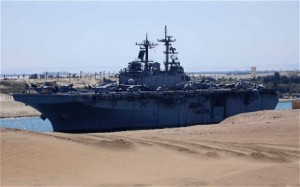Special to WorldTribune.com
WASHINGTON — A leading think tank has warned of an Egyptian backlash prompted by continued suspension of U.S. military aid.
The Washington Institute for Near East Policy said Egypt could retaliate for the U.S. refusal to release combat platforms and freeze nearly $1 billion in military aid.

In a report, the institute cited efforts within Congress to block a decision by the administration of President Barack Obama to ease the military embargo on Egypt.
“If the aid remains frozen, the United States risks losing the strategic benefits derived from its military-assistance relationship with Cairo,” the report, titled “Resuming Military Aid to Egypt: A Strategic Imperative,” said.
Institute fellow Eric Trager said Egypt has long granted the United
States preferential rights to the military. He cited the heavy U.S. Navy use
of Egypt’s Suez Canal for ships that supply troops in Afghanistan.
“The United States also stands to lose other strategic benefits if the
aid is withheld, including overflight rights and preferred access to the
Suez Canal,” the report, dated April 30, said.
On April 29, a leading member of Congress, Sen. Patrick Leahy, placed a
hold on $650 million in U.S. military aid to Egypt. Leahy, chairman of the
Senate subcommittee on foreign operations, organized both Democrats and
Republicans to oppose the easing of U.S. restrictions as Egypt maintains
its crackdown on the once-ruling Muslim Brotherhood.
Since July 2013, the administration has withheld the delivery of F-16
multi-role fighters, AH-64 Apache attack helicopters, M1A1 main battle tanks
and the Harpoon anti-ship missile. In late April, the administration decided
to ship 10 Apaches to Egypt.
Trager, regarded as a specialist on Egypt, argued that the Arab country
now contains several competing centers of power. He cited the military,
government and judiciary, the latter which sentenced 720 Brotherhood members
to death.
“Unlike the Hosni Mubarak era, when power was largely centralized in the
dictator’s hands, the new government is severely fractured, with competing
power centers — particularly the military, police, and judiciary — acting
independently,” the report said. “Withholding aid occasionally compelled
Mubarak to change his behavior, but that tool will not work as effectively
now because the state’s fractured nature means that each institution
controls little outside of its own domain.”
The report said Egypt could tighten military relations with Russia,
which offered to sell up to $3 billion worth of fighter-jets and air defense
systems to Cairo. Trager also pointed to $20 billion in aid from
Egypt’s allies in the Gulf Cooperation Council, which would enable Cairo to
diversify its military suppliers.
“Withholding aid is also unlikely to influence Egypt’s domestic
political behavior in the short run, and will undermine Washington’s ability
to influence Cairo in the future, when such pressure might have a greater
impact,” the report said.

You must be logged in to post a comment Login